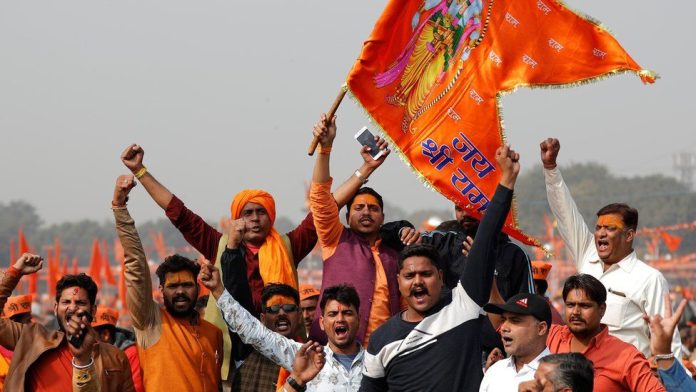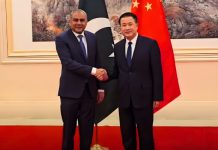DM Monitoring
NEW DELHI: Nazi imagination and practices of grotesque brutality are formative to Hindu nationalism. “Volksgemeinschaft” or national community was, for Nazis, the ideal society to be achieved through mass movement, statecraft, thieving, violence, race experiments, and Holocaust. The “Other” was its target.
M.S. Golwalkar, an early ideologue of the Rashtriya Swayamsevak Sangh (RSS), professed deep admiration for the Nazis. An inspiration to Prime Minister Narendra Modi, Golwalkar, noted: “To keep up the purity of the Race and its culture, Germany shocked the world by her purging the country of the Semitic Races – the Jews. Race pride at its highest has been manifested here.” Golwalkar continued that non-Hindus in India “may stay in the country, wholly subordinated to the Hindu nation, claiming nothing, deserving no privileges… not even citizen’s rights”.
Since their second electoral victory in 2019, the Modi and Bharatiya Janata Party-led national government has prioritised the actualisation of Akhand Bharat (“undivided India”), the mythologised once-future homeland of Hindu nationalists. Across India, experiments to forge the “Hindu national community” are predicated on the breakage of minoritised Muslims and Christians, and Adivasis and Dalits. Across the historically fraught political construct termed the “northeast”, the Hindutva movement attacks Muslim citizenship while igniting the decimation of indigeneity and the Christian community. In Kashmir, it furthers coloniality through land occupation to potentially reconstitute demographics.
Since 2022, racist discourse and monstrous violence by Hindu nationalists have spun out of control. Swarms of Hindu militias are storming village after town, supported by Hindu nationalist leaders and central and state governments, the silence of upper class-caste Hindus, and the complicity of various courts, institutions, and state forces. In 2023, the savagery reached a crescendo. UAPA. Mobs. Bombs. Bulldozers… Haryana. Uttar Pradesh. Delhi. Rajasthan. Jharkhand. Assam. Kashmir. Manipur…
In the northeast, the Modi government repositioned the 1991 Look East Policy to commence the Act East Policy for military and trade ascendancy, and also to motivate securitisation.
In contrast to security measures to safeguard freedom and well-being, securitisation weaponises social life, religion, and government. The promissory of trade and commerce accompany the fabrication of dangers posed by non-Hindus, racialised as internal antagonists. Émigrés across historically porous borders are concocted as external enemies. The capture of tribal lands and labour at the borderlands shatters indigenous identity, culture, and self-determination.
On March 27, the Manipur high court required the state government to endorse the inclusion of the dominant Hindu Meitei community under the Scheduled Tribe designation. Such inclusion adversely impacts marginalised tribes, such as the Kuki-Zo indigenous/tribe, a majority of whom converted to Christianity to escape caste/tribe oppression. Meiteis comprise over 53% of Manipur’s population, and 83% of the Meiteis are Hindus. Meitei ethnic identity emerged through the joining together of various tribal groups. Initially opposed to their incorporation into the brahminical order, the Meiteis were progressively neutralised through their Hinduisation and castefication.
Proponents of Hindutva disparage the customary and constitutional rights of Christians and Muslims, Adivasis and Dalits, and those that convert from Hinduism in India. Marginalised communities have been steadily denied access to “reservations” (akin to affirmative action), including at educational institutions. The selection, notification, and denotification of Scheduled Castes and Scheduled Tribes, and the criminalisation of tribes, are mediated by Hindu majoritarian power politics.
Made public on April 19, the Manipur high court’s directive induced large-scale dissent. The protests of the Kuki community encountered brutal reprisal as Hindu-descent Meitei and Hindu nationalist militias executed a pogrom. Between May 3 and July 2023, more than 286 attacks were committed on Kuki-prevalent areas across Manipur. Acts of terror deployed with excessive power and impunity, wherein approximately 170 members of the Kuki community died, over 48,500 persons were displaced, and 2,440 homes were torched or damaged.
Between May 4 and June 3, 255 churches were burnt down, destroyed, or looted. Meitei women were mobilised to block roads to aid the mobs. The events took place with the complicity of state officials and the partisan involvement of state forces personnel. Meitei Muslims (also Pangals) – the fourth largest community in Manipur following Hindu Meiteis, Nagas, and Kukis – were threatened for aiding the Kuki.
Mass sexual violence against two Kuki women by a Hindu Meitei mob did not receive wide condemnation until mid-July when a video depicting the public assault went viral online. The Meitei mob of reportedly 900-1,000 persons targeted a Kuki village with murder and plunder. They reportedly paraded two Kuki women naked, gangraping one of them. More women were raped. The violations and scrutiny have been unbearable for the community.
In the northeast, the Modi government repositioned the 1991 Look East Policy to commence the Act East Policy for military and trade ascendancy, and also to motivate securitisation. In contrast to security measures to safeguard freedom and well-being, securitisation weaponises social life, religion, and government. The promissory of trade and commerce accompany the fabrication of dangers posed by non-Hindus, racialised as internal antagonists. Émigrés across historically porous borders are concocted as external enemies. The capture of tribal lands and labour at the borderlands shatters indigenous identity, culture, and self-determination.
On March 27, the Manipur high court required the state government to endorse the inclusion of the dominant Hindu Meitei community under the Scheduled Tribe designation. Such inclusion adversely impacts marginalised tribes, such as the Kuki-Zo indigenous/tribe, a majority of whom converted to Christianity to escape caste/tribe oppression. Meiteis comprise over 53% of Manipur’s population, and 83% of the Meiteis are Hindus. Meitei ethnic identity emerged through the joining together of various tribal groups. Initially opposed to their incorporation into the brahminical order, the Meiteis were progressively neutralised through their Hinduisation and castefication.
Proponents of Hindutva disparage the customary and constitutional rights of Christians and Muslims, Adivasis and Dalits, and those that convert from Hinduism in India. Marginalised communities have been steadily denied access to “reservations” (akin to affirmative action), including at educational institutions. The selection, notification, and denotification of Scheduled Castes and Scheduled Tribes, and the criminalisation of tribes, are mediated by Hindu majoritarian power politics.
Made public on April 19, the Manipur high court’s directive induced large-scale dissent. The protests of the Kuki community encountered brutal reprisal as Hindu-descent Meitei and Hindu nationalist militias executed a pogrom. Between May 3 and July 2023, more than 286 attacks were committed on Kuki-prevalent areas across Manipur. Acts of terror deployed with excessive power and impunity, wherein approximately 170 members of the Kuki community died, over 48,500 persons were displaced, and 2,440 homes were torched or damaged.
Between May 4 and June 3, 255 churches were burnt down, destroyed, or looted. Meitei women were mobilised to block roads to aid the mobs. The events took place with the complicity of state officials and the partisan involvement of state forces personnel. Meitei Muslims (also Pangals) – the fourth largest community in Manipur following Hindu Meiteis, Nagas, and Kukis – were threatened for aiding the Kuki.
Mass sexual violence against two Kuki women by a Hindu Meitei mob did not receive wide condemnation until mid-July when a video depicting the public assault went viral online. The Meitei mob of reportedly 900-1,000 persons targeted a Kuki village with murder and plunder. They reportedly paraded two Kuki women naked, gangraping one of them. More women were raped. The violations and scrutiny have been unbearable for the community.




